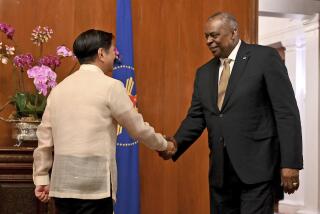Philippines Attempting to Lure Americans Back : Capital: Since the ouster of the U.S. military, officials have been pushing to attract investors.
- Share via
Some American capital is flowing at Subic Bay, the former giant U.S. naval base that is now a special economic zone. And Clark Field, the former U.S. air base, has received special designation to attract investment.
In the past two years, since the United States was ousted from its vast military facilities in the Philippines, the government there has waged a steady campaign to get the Americans back--armed not with military hardware, but cash.
Filipino officials, armed with revamped investment laws and special economic zones, have toured the United States tirelessly in search of investors. The nation needs the United States to help build highways, improve telecommunications and other infrastructure projects, said Alan Ortiz, the undersecretary of the Coordinating Council of the Philippine Assistance Program, during a recent investment seminar in Long Beach.
“The U.S. has key strengths in certain technologies that we need in order to build these infrastructure programs,” said Ortiz, a key figure in the investment recruiting effort.
The nation’s economy is gaining strength, he said, but needs infrastructure improvements to ensure continued expansion. Among the opportunities for American investors, he said, are projects within Manila, designed to help transform the city into one of Asia’s major financial centers, Ortiz said.
Projects currently in the bidding stage include the development of highways, railways and waterways serving Manila and the surrounding cities. The government is also trying to find investors for power generating plants, telecommunications systems and port improvement projects. Another major effort involves improving the drinking water supply for the cities of Manila and Cavite, including digging wells and building water treatment plants.
As incentives to foreign investors, Ortiz explained, the government will guarantee investors at least a 12% to 20% return, in addition to the normal profits earned. President Fidel V. Ramos signed a law in May allowing other incentives, including a three- to six-year tax holiday, and tax deductions for labor expenses. The government will also allow foreign investors in certain infrastructure projects to hire foreign nationals for five years to work in supervisory, technical and advisory positions.
“The law allows us to be flexible in packaging infrastructure projects,” Ortiz said. “We have liberalized the rules and regulations that guide the way we manage these projects in terms of risks.”
What businesses do need to be aware of are provisions of the law that restrict foreign ownership of public utilities systems, limits on lending by government-owned banks and requirements for bidders to demonstrate experience on similar projects.
Ortiz said businesses interested in the infrastructure programs would go through relatively smooth procedures to start up, thanks in part to the new investment law. His coordinating council, which oversees development projects, will also help smooth the way for investors, he said.
After hearing Ortiz and other Filipino officials make their case for foreign investment, Tom Burr, an export finance specialist at Union Bank, said the session was helpful.
Burr said the seminar had the right people on hand to answer the majority of the questions posed, which helped provide a good insight into the present Philippine economy.
“It was a plus for the Philippines to do it,” Burr said. “Giving us the latest information helped ease a lot of concerns. It didn’t mitigate all the risks that are there but having all the new data helps our understanding of the business climate there.”
Burr said he was one of many who came to hear the delegation from the Philippines who were skeptical about doing business there, based on the anti-American sentiments expressed in the 1991 Filipino vote to oust the U.S. military from bases and the recent Filipino political instability. Ortiz helped ease some concerns, Burr said.
Ortiz said the Philippines is more stable and that the “economy is well on its way to achieving a higher growth. . . . That is the key because in the past, we’ve been subject to what’s been called boom and bust cycles. Now we think we’ve managed to clear that cycle.”
The delegation is also planning presentations in Houston, Chicago, New York, Seattle and Washington, D.C., Ortiz said. He said he plans to be prompt in getting back with interested companies to match their proposals with projects on the drawing board.
“We hope to follow up quickly with these inquiries and if feasible, we want to start negotiating,” Ortiz said.
More to Read
Sign up for Essential California
The most important California stories and recommendations in your inbox every morning.
You may occasionally receive promotional content from the Los Angeles Times.













